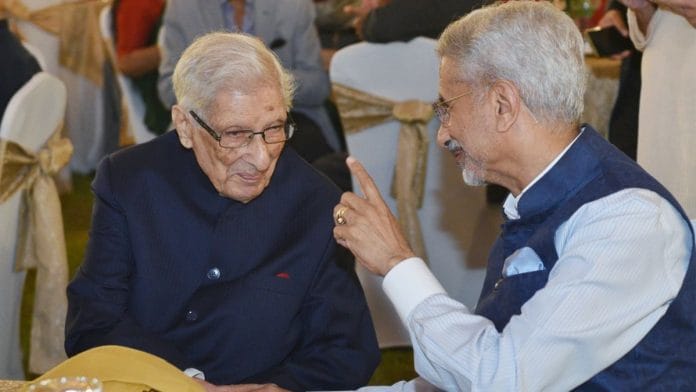New Delhi: Maharaja Krishna Rasgotra is one of a handful of living civil servants to have crossed 100 years of age after leading a power-packed diplomatic career, most notably in his role as foreign secretary from 1982 to 1985.
Only a few centenarian ex-public servants, such as Rasgotra, are alive across the world today. They include former Kerala chief minister V.S. Achuthanandan, Britain’s oldest surviving former MP Patrick Duffy, and former FBI director William H. Webster.
Dubbed a “legend” and “titan” in the Indian Foreign Service (IFS) by External Affairs Minister S. Jaishankar, M.K. Rasgotra celebrated his 100th birthday at a reception hosted by Foreign Secretary Vikram Misiri in New Delhi Monday. The event was attended by Jaishankar.
“We celebrate a legend of the Indian Foreign Service today, former foreign secretary M.K. Rasgotra, who just turned 100. A titan of his times, Foreign Secretary Rasgotra indeed is the GOAT of IFS,” wrote Jaishankar in a statement on X.
Misri remarked that with his grace, charm, and wit “undiminished”, the centenarian continues to be a role model for diplomats.
Rasgotra has seen and played a key role in the transformation of Indian foreign policy from the time of India’s Independence to the 1990s.
“International relations are not a fixed thing. Countries change; their policies change. A country like India has to review foreign policy (based) on what is relevant today. The emphasis today is not on non-alignment, but on individual relations with all countries,” he told ThePrint in a 2019 interview.
M.K. Rasgotra was considered a close aide to Jawaharlal Nehru, India’s first prime minister. While serving as a young official in the Ministry of External Affairs (MEA) in 1951, Rasgotra suggested ‘Chanakyapuri’ as the name for a central Delhi-based diplomatic enclave close to the sprawling Nehru Park. A 26-year-old assistant chief of protocol at the time, his suggestion stuck.
Seven decades later, Chanakyapuri, named after Chanakya, the fourth-century philosopher and key advisor to Mauryan Empire founder Chandragupta, now hosts most of the foreign embassies in New Delhi.
Though a ‘Nehru-ite’, Rasgotra was not “blind” to the former prime minister’s “shortcomings”, former external affairs minister K. Natwar Singh remarked in a 2016 op-ed for India Today.
“He [Rasgotra] lets him off lightly on Kashmir but is severe on him for his China policy…Nor does he spare Nehru for keeping British officers to head the Indian armed forces after India’s Independence. The navy chief was a British admiral till 1958,” wrote Singh in his review of his peer’s 2016 autobiography.
Also Read: MEA slams Iran’s Khamenei’s remarks on Indian Muslims’ ‘suffering’ as ‘misinformed’, ‘unacceptable’
A life in diplomacy
During his forty-year diplomatic career, which lasted till March 1990, Rasgotra served in several key positions in the MEA.
The most notable was his tenure as foreign secretary from May 1982 to January 1985. This was a period marked by India-Pakistan tensions, the Soviet-Afghan War, the conflict in Sri Lanka, and the Cold War. Rasgotra was a part of shaping India’s diplomatic strategies and responses at the time, emphasising the importance of regional stability and security.
Rasgotra also served as foreign secretary during the 1984 Bhopal Gas tragedy, which killed over 3,000 people.
The gas leak occurred at a pesticide plant run by an American company, Union Carbide India Limited. At the time, Union Carbide Corporation chief Warren Anderson wanted to visit the site of the tragedy but only agreed to do so on the condition of “safe passage”.
For this, the American Embassy in Delhi directly contacted Rasgotra, the then-foreign secretary, for assurances. Rasgotra confirmed this in a 2010 interview with journalist Karan Thapar.
During 1967-1990, Rasgotra’s ambassadorial career took him to the US, UK, France, Nepal, Morocco, Tunisia, the Netherlands, and the headquarters of UNESCO in Paris. His first foreign posting to the US coincided with Nehru’s maiden visit to Washington in 1961.
After his retirement in 1990, Rasgotra served as an honourary visiting professor at the Jawaharlal Nehru University (JNU), a regents professor at the University of California, a member of the United Nations’ disarmament advisory council, and a chairman of India’s National Security Advisory Board.
In his 2016 autobiography, ‘A life in diplomacy‘, he notes: “…There is nothing in my upbringing to qualify me for the diplomatic profession and there are opportunities galore for young men and women from humble origins to rise through hard work and serve the country in positions of responsibility.”
Rasgotra was born in 1924 to a Dogra Brahmin family in Jammu and Kashmir (J&K). An alumnus of Panjab University, he was born in Shakargarh, a small town that currently lies in Pakistan.
He is also an ardent devotee of Sathya Sai Baba, having met the Indian guru for the first time in March 1972 and a regular visitor to Prasanthi Nilayam (ashram) since.
“I had a brief darshan of Bhagawan Baba for the first time during his visit to North Delhi in March 1972, when he was staying at the Golf Links residence of my friend Sohan Lal. I was a bit of an agnostic then,” he once wrote in a feature piece.
(Edited by Madhurita Goswami)
Also Read: Hit and scoot: China’s Global Times targets Jaishankar in article, withdraws English version later






